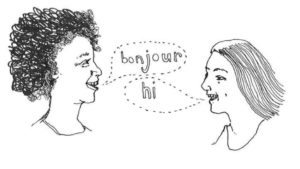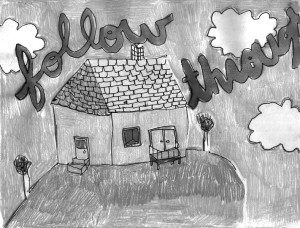Bonjour-Hi? A Teeny-Tiny History of Language Politics in Québec
By Joël Pedneault

New France was forcefully incorporated into the British Empire in 1760. The linguistic conflict this created can be understood as an inter-settler conflict over who gets to benefit from the process of colonization orchestrated by business and the State.
After 1760, the British allowed the Catholic Church to keep teaching French. Since the Church’s policy was also to pressure women to make babies (the so-called “revenge of the cradles”), the largely rural French-speaking population grew fast and emigrated to cities, where English was more commonly used. Around the same time, the Church also forced indigenous children into residential schools and taught them French.
The growth of an urban francophone bourgeoisie — and of working-class francophone neighbourhoods that could be mobilized to support bourgeois politicians — set in motion the Quiet Revolution of the 1960s. The State took over schools and hospitals from the Church. When the Parti Québécois came to power in 1976, one of the first things it did was adopt the Charter of the French Language, the backbone of language policy in Québec to this day.
The new law stated that French would be the exclusive language of the (newly expanded) State. Amongst other things, this law required businesses with more than fifty employees to operate in French. Francophone factory workers could now take orders and shop for things in the same language used at home. The law also restricted people from attending English-language schools unless their parents had attended one in Québec; as a result, young migrants to Québec have to attend French schools. The law does not apply to Native reserves; thus some indigenous language revival efforts have been set up in indigenous communities in the last few decades.
A political movement exists around the status of French. One demand is that language laws be applied to workplaces with fewer than fifty employees. Another demand is for the State to close a loophole used by some parents who enroll their children in English private schools, allowing the children to eventually transfer to English public schools. Left criticisms of this movement are that it marginalizes class struggles and ignores migrant realities.
For further reading, compare Michèle Lalonde’s poem “Speak White,” written at the height of the nationalist movement in the late 1960s, with Marco Micone’s poem “Speak What” about the experience of migrants in the new Québec of 1989.
